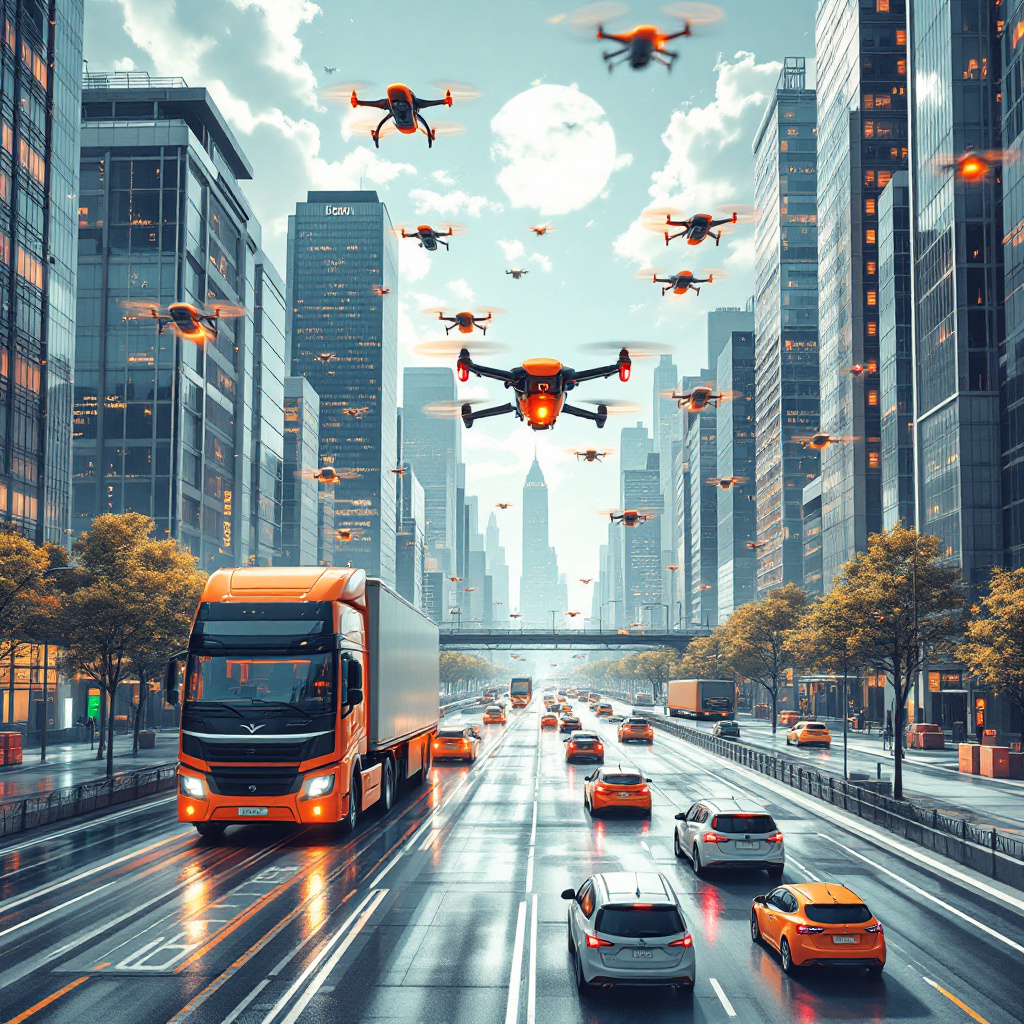In de 21e eeuw, drones en autonome voertuigen in transport hebben mobiliteit, logistiek en stadsplanning veranderd. Deze technologieën verbeteren de efficiëntie, veiligheid en duurzaamheid terwijl ze de kosten en levertijden verlagen. In dit artikel worden de nieuwste trends, innovaties en uitdagingen op het gebied van drones en autonome voertuigen in transport en hoe ze de toekomst van mobiliteit vormgeven.
De rol van drones in modern vervoer
Drones in transport nu ook voor andere dan militaire toepassingen. Ze worden op grote schaal gebruikt in de logistiek, last-mile leveringen en stedelijke luchtmobiliteit.
Vrachtlevering met drones
Drones in logistiek het stroomlijnen van last-mile leveringen. Bedrijven gebruiken dronetechnologie om sneller te verzenden, kosten te besparen en de betrouwbaarheid te verbeteren. Deze autonome luchtvoertuigen zorgen voor snelle pakketbezorging, wat e-commerce en toeleveringsketens ten goede komt.
Stedelijke mobiliteit door de lucht (UAM) en passagiersvervoer
Stedelijke luchtmobiliteit (UAM) ziet drones passagiers en goederen vervoeren in steden en zo verkeersopstoppingen verminderen. Autonome luchttaxi's en drone-gebaseerde afleveringssystemen worden wereldwijd getest. Goedkeuring door de regelgevende instanties, acceptatie door het publiek en bezorgdheid over de veiligheid blijven echter belangrijke obstakels.
Autonome voertuigen en slim vervoer
Autonome voertuigen (AV's) in transport veranderen de manier waarop mensen en goederen zich verplaatsen. Van zelfrijdende taxi's tot vrachtvervoer, deze voertuigen maken gebruik van AI, sensoren en voorspellende analyses om de mobiliteit te verbeteren.
Belangrijkste technologische ontwikkelingen
Autonome voertuigtechnologie vertrouwt op LiDAR, radar en AI-gestuurde besluitvorming. Toonaangevende bedrijven investeren in zelfrijdende vrachtwagens en robo-taxi'seen revolutie teweeg in commercieel vervoer en openbare mobiliteit.
Uitdagingen in autonoom vervoer
Ondanks de snelle vooruitgang, adoptie autonoom voertuig staat voor uitdagingen. Veiligheidsproblemen, veranderende regelgeving en hiaten in de infrastructuur vertragen een wijdverspreide inzet. Voor zelfrijdende auto's en vrachtwagens mainstream worden, moeten er strenge veiligheidstests en voorschriften komen.
Drones en autonome voertuigen integreren voor efficiëntie
De combinatie van drones en autonome voertuigen in transport biedt nieuwe mogelijkheden voor slimme logistiek. Een hybride model, waarbij zelfrijdende vrachtwagens fungeren als mobiele hubs die drones lanceren voor leveringen op de laatste kilometers, verbetert efficiëntie van de toeleveringsketen en vermindert opstoppingen.
Toekomstige trends in transport
De toekomst van autonome mobiliteit zal brengen:
- Elektrische voertuigen voor verticaal opstijgen en landen (eVTOL) voor woon-werkverkeer in de stad.
- AI-gestuurd wagenparkbeheer om transportroutes te optimaliseren.
- Volledig autonome ritdeeldiensten het integreren van zelfrijdende technologie.
Conclusie
De Transportindustrie van de 21e eeuw evolueert snel met drones en autonome voertuigen in de voorhoede. Deze technologieën zullen stedelijke mobiliteit, logistiek en commercieel vervoerondanks uitdagingen op het gebied van regelgeving en veiligheid. Naarmate de technologie voortschrijdt, drones en autonome voertuigen in transport zullen een cruciale rol spelen in het creëren van een efficiëntere en duurzamere toekomst.

 Drones en autonome voertuigen in de transportsector: Trends">
Drones en autonome voertuigen in de transportsector: Trends">
